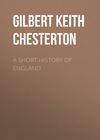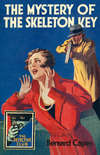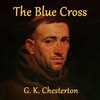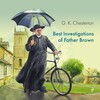Czytaj książkę: «A Short History of England», strona 5
At the grave of the dead man broke forth what can only be called an epidemic of healing. For miracles so narrated there is the same evidence as for half the facts of history; and any one denying them must deny them upon a dogma. But something followed which would seem to modern civilization even more monstrous than a miracle. If the reader can imagine Mr. Cecil Rhodes submitting to be horsewhipped by a Boer in St. Paul's Cathedral, as an apology for some indefensible death incidental to the Jameson Raid, he will form but a faint idea of what was meant when Henry II. was beaten by monks at the tomb of his vassal and enemy. The modern parallel called up is comic, but the truth is that mediæval actualities have a violence that does seem comic to our conventions. The Catholics of that age were driven by two dominant thoughts: the all-importance of penitence as an answer to sin, and the all-importance of vivid and evident external acts as a proof of penitence. Extravagant humiliation after extravagant pride for them restored the balance of sanity. The point is worth stressing, because without it moderns make neither head nor tail of the period. Green gravely suggests, for instance, of Henry's ancestor Fulk of Anjou, that his tyrannies and frauds were further blackened by "low superstition," which led him to be dragged in a halter round a shrine, scourged and screaming for the mercy of God. Mediævals would simply have said that such a man might well scream for it, but his scream was the only logical comment he could make. But they would have quite refused to see why the scream should be added to the sins and not subtracted from them. They would have thought it simply muddle-headed to have the same horror at a man for being horribly sinful and for being horribly sorry.
But it may be suggested, I think, though with the doubt proper to ignorance, that the Angevin ideal of the King's justice lost more by the death of St. Thomas than was instantly apparent in the horror of Christendom, the canonization of the victim and the public penance of the tyrant. These things indeed were in a sense temporary; the King recovered the power to judge clerics, and many later kings and justiciars continued the monarchical plan. But I would suggest, as a possible clue to puzzling after events, that here and by this murderous stroke the crown lost what should have been the silent and massive support of its whole policy. I mean that it lost the people.
It need not be repeated that the case for despotism is democratic. As a rule its cruelty to the strong is kindness to the weak. An autocrat cannot be judged as a historical character by his relations with other historical characters. His true applause comes not from the few actors on the lighted stage of aristocracy, but from that enormous audience which must always sit in darkness throughout the drama. The king who helps numberless helps nameless men, and when he flings his widest largesse he is a Christian doing good by stealth. This sort of monarchy was certainly a mediæval ideal, nor need it necessarily fail as a reality. French kings were never so merciful to the people as when they were merciless to the peers; and it is probably true that a Czar who was a great lord to his intimates was often a little father in innumerable little homes. It is overwhelmingly probable that such a central power, though it might at last have deserved destruction in England as in France, would in England as in France have prevented the few from seizing and holding all the wealth and power to this day. But in England it broke off short, through something of which the slaying of St. Thomas may well have been the supreme example. It was something overstrained and startling and against the instincts of the people. And of what was meant in the Middle Ages by that very powerful and rather peculiar thing, the people, I shall speak in the next chapter.
In any case this conjecture finds support in the ensuing events. It is not merely that, just as the great but personal plan of the Conqueror collapsed after all into the chaos of the Stephen transition, so the great but personal plan of the first Plantagenet collapsed into the chaos of the Barons' Wars. When all allowance is made for constitutional fictions and afterthoughts, it does seem likely that here for the first time some moral strength deserted the monarchy. The character of Henry's second son John (for Richard belongs rather to the last chapter) stamped it with something accidental and yet symbolic. It was not that John was a mere black blot on the pure gold of the Plantagenets, the texture was much more mixed and continuous; but he really was a discredited Plantagenet, and as it were a damaged Plantagenet. It was not that he was much more of a bad man than many opposed to him, but he was the kind of bad man whom bad men and good do combine to oppose. In a sense subtler than that of the legal and parliamentary logic-chopping invented long afterwards, he certainly managed to put the Crown in the wrong. Nobody suggested that the barons of Stephen's time starved men in dungeons to promote political liberty, or hung them up by the heels as a symbolic request for a free parliament. In the reign of John and his son it was still the barons, and not in the least the people, who seized the power; but there did begin to appear a case for their seizing it, for contemporaries as well as constitutional historians afterwards. John, in one of his diplomatic doublings, had put England into the papal care, as an estate is put in Chancery. And unluckily the Pope, whose counsels had generally been mild and liberal, was then in his death-grapple with the Germanic Emperor and wanted every penny he could get to win. His winning was a blessing to Europe, but a curse to England, for he used the island as a mere treasury for this foreign war. In this and other matters the baronial party began to have something like a principle, which is the backbone of a policy. Much conventional history that connects their councils with a thing like our House of Commons is as far-fetched as it would be to say that the Speaker wields a Mace like those which the barons brandished in battle. Simon de Montfort was not an enthusiast for the Whig theory of the British Constitution, but he was an enthusiast for something. He founded a parliament in a fit of considerable absence of mind; but it was with true presence of mind, in the responsible and even religious sense which had made his father so savage a Crusader against heretics, that he laid about him with his great sword before he fell at Evesham.
Magna Carta was not a step towards democracy, but it was a step away from despotism. If we hold that double truth firmly, we have something like a key to the rest of English history. A rather loose aristocracy not only gained but often deserved the name of liberty. And the history of the English can be most briefly summarized by taking the French motto of "Liberty, Equality, and Fraternity," and noting that the English have sincerely loved the first and lost the other two.
In the contemporary complication much could be urged both for the Crown and the new and more national rally of the nobility. But it was a complication, whereas a miracle is a plain matter that any man can understand. The possibilities or impossibilities of St. Thomas Becket were left a riddle for history; the white flame of his audacious theocracy was frustrated, and his work cut short like a fairy tale left untold. But his memory passed into the care of the common people, and with them he was more active dead than alive – yes, even more busy. In the next chapter we shall consider what was meant in the Middle Ages by the common people, and how uncommon we should think it to-day. And in the last chapter we have already seen how in the Crusading age the strangest things grew homely, and men fed on travellers' tales when there were no national newspapers. A many-coloured pageant of martyrology on numberless walls and windows had familiarized the most ignorant with alien cruelties in many climes; with a bishop flayed by Danes or a virgin burned by Saracens, with one saint stoned by Jews and another hewn in pieces by negroes. I cannot think it was a small matter that among these images one of the most magnificent had met his death but lately at the hands of an English monarch. There was at least something akin to the primitive and epical romances of that period in the tale of those two mighty friends, one of whom struck too hard and slew the other. It may even have been so early as this that something was judged in silence; and for the multitude rested on the Crown a mysterious seal of insecurity like that of Cain, and of exile on the English kings.
VIII
THE MEANING OF MERRY ENGLAND
The mental trick by which the first half of English history has been wholly dwarfed and dehumanized is a very simple one. It consists in telling only the story of the professional destroyers and then complaining that the whole story is one of destruction. A king is at the best a sort of crowned executioner; all government is an ugly necessity; and if it was then uglier it was for the most part merely because it was more difficult. What we call the Judges' circuits were first rather the King's raids. For a time the criminal class was so strong that ordinary civil government was conducted by a sort of civil war. When the social enemy was caught at all he was killed or savagely maimed. The King could not take Pentonville Prison about with him on wheels. I am far from denying that there was a real element of cruelty in the Middle Ages; but the point here is that it was concerned with one side of life, which is cruel at the best; and that this involved more cruelty for the same reason that it involved more courage. When we think of our ancestors as the men who inflicted tortures, we ought sometimes to think of them as the men who defied them. But the modern critic of mediævalism commonly looks only at these crooked shadows and not at the common daylight of the Middle Ages. When he has got over his indignant astonishment at the fact that fighters fought and that hangmen hanged, he assumes that any other ideas there may have been were ineffectual and fruitless. He despises the monk for avoiding the very same activities which he despises the warrior for cultivating. And he insists that the arts of war were sterile, without even admitting the possibility that the arts of peace were productive. But the truth is that it is precisely in the arts of peace, and in the type of production, that the Middle Ages stand singular and unique. This is not eulogy but history; an informed man must recognize this productive peculiarity even if he happens to hate it. The melodramatic things currently called mediæval are much older and more universal; such as the sport of tournament or the use of torture. The tournament was indeed a Christian and liberal advance on the gladiatorial show, since the lords risked themselves and not merely their slaves. Torture, so far from being peculiarly mediæval, was copied from pagan Rome and its most rationalist political science; and its application to others besides slaves was really part of the slow mediæval extinction of slavery. Torture, indeed, is a logical thing common in states innocent of fanaticism, as in the great agnostic empire of China. What was really arresting and remarkable about the Middle Ages, as the Spartan discipline was peculiar to Sparta, or the Russian communes typical of Russia, was precisely its positive social scheme of production, of the making, building and growing of all the good things of life.
For the tale told in a book like this cannot really touch on mediæval England at all. The dynasties and the parliaments passed like a changing cloud and across a stable and fruitful landscape. The institutions which affected the masses can be compared to corn or fruit trees in one practical sense at least, that they grew upwards from below. There may have been better societies, and assuredly we have not to look far for worse; but it is doubtful if there was ever so spontaneous a society. We cannot do justice, for instance, to the local government of that epoch, even where it was very faulty and fragmentary, by any comparisons with the plans of local government laid down to-day. Modern local government always comes from above; it is at best granted; it is more often merely imposed. The modern English oligarchy, the modern German Empire, are necessarily more efficient in making municipalities upon a plan, or rather a pattern. The mediævals not only had self-government, but their self-government was self-made. They did indeed, as the central powers of the national monarchies grew stronger, seek and procure the stamp of state approval; but it was approval of a popular fact already in existence. Men banded together in guilds and parishes long before Local Government Acts were dreamed of. Like charity, which was worked in the same way, their Home Rule began at home. The reactions of recent centuries have left most educated men bankrupt of the corporate imagination required even to imagine this. They only think of a mob as a thing that breaks things – even if they admit it is right to break them. But the mob made these things. An artist mocked as many-headed, an artist with many eyes and hands, created these masterpieces. And if the modern sceptic, in his detestation of the democratic ideal, complains of my calling them masterpieces, a simple answer will for the moment serve. It is enough to reply that the very word "masterpiece" is borrowed from the terminology of the mediæval craftsmen. But such points in the Guild System can be considered a little later; here we are only concerned with the quite spontaneous springing upwards of all these social institutions, such as they were. They rose in the streets like a silent rebellion; like a still and statuesque riot. In modern constitutional countries there are practically no political institutions thus given by the people; all are received by the people. There is only one thing that stands in our midst, attenuated and threatened, but enthroned in some power like a ghost of the Middle Ages: the Trades Unions.
In agriculture, what had happened to the land was like a universal landslide. But by a prodigy beyond the catastrophes of geology it may be said that the land had slid uphill. Rural civilization was on a wholly new and much higher level; yet there was no great social convulsions or apparently even great social campaigns to explain it. It is possibly a solitary instance in history of men thus falling upwards; at least of outcasts falling on their feet or vagrants straying into the promised land. Such a thing could not be and was not a mere accident; yet, if we go by conscious political plans, it was something like a miracle. There had appeared, like a subterranean race cast up to the sun, something unknown to the august civilization of the Roman Empire – a peasantry. At the beginning of the Dark Ages the great pagan cosmopolitan society now grown Christian was as much a slave state as old South Carolina. By the fourteenth century it was almost as much a state of peasant proprietors as modern France. No laws had been passed against slavery; no dogmas even had condemned it by definition; no war had been waged against it, no new race or ruling caste had repudiated it; but it was gone. This startling and silent transformation is perhaps the best measure of the pressure of popular life in the Middle Ages, of how fast it was making new things in its spiritual factory. Like everything else in the mediæval revolution, from its cathedrals to its ballads, it was as anonymous as it was enormous. It is admitted that the conscious and active emancipators everywhere were the parish priests and the religious brotherhoods; but no name among them has survived and no man of them has reaped his reward in this world. Countless Clarksons and innumerable Wilberforces, without political machinery or public fame, worked at death-beds and confessionals in all the villages of Europe; and the vast system of slavery vanished. It was probably the widest work ever done which was voluntary on both sides; and the Middle Ages was in this and other things the age of volunteers. It is possible enough to state roughly the stages through which the thing passed; but such a statement does not explain the loosening of the grip of the great slave-owners; and it cannot be explained except psychologically. The Catholic type of Christianity was not merely an element, it was a climate; and in that climate the slave would not grow. I have already suggested, touching that transformation of the Roman Empire which was the background of all these centuries, how a mystical view of man's dignity must have this effect. A table that walked and talked, or a stool that flew with wings out of window, would be about as workable a thing as an immortal chattel. But though here as everywhere the spirit explains the processes, and the processes cannot even plausibly explain the spirit, these processes involve two very practical points, without which we cannot understand how this great popular civilization was created – or how it was destroyed.
What we call the manors were originally the villae of the pagan lords, each with its population of slaves. Under this process, however it be explained, what had occurred was the diminishment of the lords' claim to the whole profit of a slave estate, by which it became a claim to the profit of part of it, and dwindled at last to certain dues or customary payments to the lord, having paid which the slave could enjoy not only the use of the land but the profit of it. It must be remembered that over a great part, and especially very important parts, of the whole territory, the lords were abbots, magistrates elected by a mystical communism and themselves often of peasant birth. Men not only obtained a fair amount of justice under their care, but a fair amount of freedom even from their carelessness. But two details of the development are very vital. First, as has been hinted elsewhere, the slave was long in the intermediate status of a serf. This meant that while the land was entitled to the services of the man, he was equally entitled to the support of the land. He could not be evicted; he could not even, in the modern fashion, have his rent raised. At the beginning it was merely that the slave was owned, but at least he could not be disowned. At the end he had really become a small landlord, merely because it was not the lord that owned him, but the land. It is hardly unsafe to suggest that in this (by one of the paradoxes of this extraordinary period) the very fixity of serfdom was a service to freedom. The new peasant inherited something of the stability of the slave. He did not come to life in a competitive scramble where everybody was trying to snatch his freedom from him. He found himself among neighbours who already regarded his presence as normal and his frontiers as natural frontiers, and among whom all-powerful customs crushed all experiments in competition. By a trick or overturn no romancer has dared to put in a tale, this prisoner had become the governor of his own prison. For a little time it was almost true that an Englishman's house was his castle, because it had been built strong enough to be his dungeon.
The other notable element was this: that when the produce of the land began by custom to be cut up and only partially transmitted to the lord, the remainder was generally subdivided into two types of property. One the serfs enjoyed severally, in private patches, while the other they enjoyed in common, and generally in common with the lord. Thus arose the momentously important mediæval institutions of the Common Land, owned side by side with private land. It was an alternative and a refuge. The mediævals, except when they were monks, were none of them Communists; but they were all, as it were, potential Communists. It is typical of the dark and dehumanized picture now drawn of the period that our romances constantly describe a broken man as falling back on the forests and the outlaw's den, but never describe him as falling back on the common land, which was a much more common incident. Mediævalism believed in mending its broken men; and as the idea existed in the communal life for monks, it existed in the communal land for peasants. It was their great green hospital, their free and airy workhouse. A Common was not a naked and negative thing like the scrub or heath we call a Common on the edges of the suburbs. It was a reserve of wealth like a reserve of grain in a barn; it was deliberately kept back as a balance, as we talk of a balance at the bank. Now these provisions for a healthier distribution of property would by themselves show any man of imagination that a real moral effort had been made towards social justice; that it could not have been mere evolutionary accident that slowly turned the slave into a serf, and the serf into a peasant proprietor. But if anybody still thinks that mere blind luck, without any groping for the light, had somehow brought about the peasant condition in place of the agrarian slave estate, he has only to turn to what was happening in all the other callings and affairs of humanity. Then he will cease to doubt. For he will find the same mediæval men busy upon a social scheme which points as plainly in effect to pity and a craving for equality. And it is a system which could no more be produced by accident than one of their cathedrals could be built by an earthquake.
Most work beyond the primary work of agriculture was guarded by the egalitarian vigilance of the Guilds. It is hard to find any term to measure the distance between this system and modern society; one can only approach it first by the faint traces it has left. Our daily life is littered with a debris of the Middle Ages, especially of dead words which no longer carry their meaning. I have already suggested one example. We hardly call up the picture of a return to Christian Communism whenever we mention Wimbledon Common. This truth descends to such trifles as the titles which we write on letters and postcards. The puzzling and truncated monosyllable "Esq." is a pathetic relic of a remote evolution from chivalry to snobbery. No two historic things could well be more different than an esquire and a squire. The first was above all things an incomplete and probationary position – the tadpole of knighthood; the second is above all things a complete and assured position – the status of the owners and rulers of rural England throughout recent centuries. Our esquires did not win their estates till they had given up any particular fancy for winning their spurs. Esquire does not mean squire, and esq. does not mean anything. But it remains on our letters a little wriggle in pen and ink and an indecipherable hieroglyph twisted by the strange turns of our history, which have turned a military discipline into a pacific oligarchy, and that into a mere plutocracy at last. And there are similar historic riddles to be unpicked in the similar forms of social address. There is something singularly forlorn about the modern word "Mister." Even in sound it has a simpering feebleness which marks the shrivelling of the strong word from which it came. Nor, indeed, is the symbol of the mere sound inaccurate. I remember seeing a German story of Samson in which he bore the unassuming name of Simson, which surely shows Samson very much shorn. There is something of the same dismal diminuendo in the evolution of a Master into a Mister.
The very vital importance of the word "Master" is this. A Guild was, very broadly speaking, a Trade Union in which every man was his own employer. That is, a man could not work at any trade unless he would join the league and accept the laws of that trade; but he worked in his own shop with his own tools, and the whole profit went to himself. But the word "employer" marks a modern deficiency which makes the modern use of the word "master" quite inexact. A master meant something quite other and greater than a "boss." It meant a master of the work, where it now means only a master of the workmen. It is an elementary character of Capitalism that a shipowner need not know the right end of a ship, or a landowner have even seen the landscape, that the owner of a goldmine may be interested in nothing but old pewter, or the owner of a railway travel exclusively in balloons. He may be a more successful capitalist if he has a hobby of his own business; he is often a more successful capitalist if he has the sense to leave it to a manager; but economically he can control the business because he is a capitalist, not because he has any kind of hobby or any kind of sense. The highest grade in the Guild system was a Master, and it meant a mastery of the business. To take the term created by the colleges in the same epoch, all the mediæval bosses were Masters of Arts. The other grades were the journeyman and the apprentice; but like the corresponding degrees at the universities, they were grades through which every common man could pass. They were not social classes; they were degrees and not castes. This is the whole point of the recurrent romance about the apprentice marrying his master's daughter. The master would not be surprised at such a thing, any more than an M.A. would swell with aristocratic indignation when his daughter married a B.A.
When we pass from the strictly educational hierarchy to the strictly egalitarian ideal, we find again that the remains of the thing to-day are so distorted and disconnected as to be comic. There are City Companies which inherit the coats of arms and the immense relative wealth of the old Guilds, and inherit nothing else. Even what is good about them is not what was good about the Guilds. In one case we shall find something like a Worshipful Company of Bricklayers, in which, it is unnecessary to say, there is not a single bricklayer or anybody who has ever known a bricklayer, but in which the senior partners of a few big businesses in the City, with a few faded military men with a taste in cookery, tell each other in after-dinner speeches that it has been the glory of their lives to make allegorical bricks without straw. In another case we shall find a Worshipful Company of Whitewashers who do deserve their name, in the sense that many of them employ a large number of other people to whitewash. These Companies support large charities and often doubtless very valuable charities; but their object is quite different from that of the old charities of the Guilds. The aim of the Guild charities was the same as the aim of the Common Land. It was to resist inequality – or, as some earnest old gentlemen of the last generation would probably put it, to resist evolution. It was to ensure, not only that bricklaying should survive and succeed, but that every bricklayer should survive and succeed. It sought to rebuild the ruins of any bricklayer, and to give any faded whitewasher a new white coat. It was the whole aim of the Guilds to cobble their cobblers like their shoes and clout their clothiers with their clothes; to strengthen the weakest link, or go after the hundredth sheep; in short, to keep the row of little shops unbroken like a line of battle. It resisted the growth of a big shop like the growth of a dragon. Now even the whitewashers of the Whitewashers Company will not pretend that it exists to prevent a small shop being swallowed by a big shop, or that it has done anything whatever to prevent it. At the best the kindness it would show to a bankrupt whitewasher would be a kind of compensation; it would not be reinstatement; it would not be the restoration of status in an industrial system. So careful of the type it seems, so careless of the single life; and by that very modern evolutionary philosophy the type itself has been destroyed. The old Guilds, with the same object of equality, of course, insisted peremptorily upon the same level system of payment and treatment which is a point of complaint against the modern Trades Unions. But they insisted also, as the Trades Unions cannot do, upon a high standard of craftsmanship, which still astonishes the world in the corners of perishing buildings or the colours of broken glass. There is no artist or art critic who will not concede, however distant his own style from the Gothic school, that there was in this time a nameless but universal artistic touch in the moulding of the very tools of life. Accident has preserved the rudest sticks and stools and pots and pans which have suggestive shapes as if they were possessed not by devils but by elves. For they were, indeed, as compared with subsequent systems, produced in the incredible fairyland of a free country.
That the most mediæval of modern institutions, the Trades Unions, do not fight for the same ideal of æsthetic finish is true and certainly tragic; but to make it a matter of blame is wholly to misunderstand the tragedy. The Trades Unions are confederations of men without property, seeking to balance its absence by numbers and the necessary character of their labour. The Guilds were confederations of men with property, seeking to ensure each man in the possession of that property. This is, of course, the only condition of affairs in which property can properly be said to exist at all. We should not speak of a negro community in which most men were white, but the rare negroes were giants. We should not conceive a married community in which most men were bachelors, and three men had harems. A married community means a community where most people are married; not a community where one or two people are very much married. A propertied community means a community where most people have property; not a community where there are a few capitalists. But in fact the Guildsmen (as also, for that matter, the serfs, semi-serfs and peasants) were much richer than can be realized even from the fact that the Guilds protected the possession of houses, tools, and just payment. The surplus is self-evident upon any just study of the prices of the period, when all deductions have been made, of course, for the different value of the actual coinage. When a man could get a goose or a gallon of ale for one or two of the smallest and commonest coins, the matter is in no way affected by the name of those coins. Even where the individual wealth was severely limited, the collective wealth was very large – the wealth of the Guilds, of the parishes, and especially of the monastic estates. It is important to remember this fact in the subsequent history of England.




















